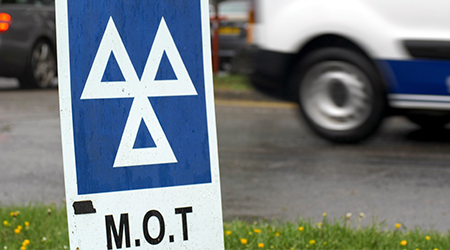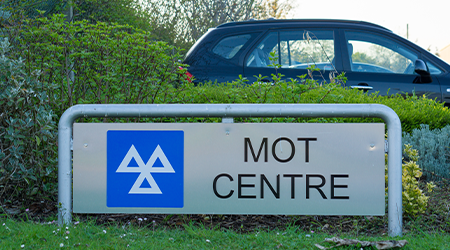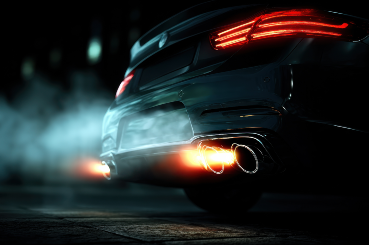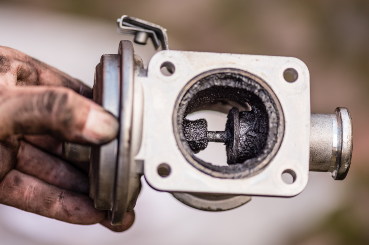
A car can fail its MOT for any number of reasons. Numerous MOT checks are carried out during the test and your vehicle only has to fail one to fail its MOT.
So to maximise your car’s chances of passing first time, it’s worth following a simple pre-MOT checklist; simple checks you can do at home.
Spending just a few minutes carrying out some pre-MOT checks on the interior and exterior of your car could also save you the additional costs of unnecessary repairs, as well as the extra time lost.
To help with your pre-MOT inspection, we’ve created this handy list of areas of the car to check yourself. We’ve also included what things to look for as you work through your MOT preparation checklist.
How to prepare for your car MOT test
Once you have made your MOT online booking, it would be helpful to have both your current MOT certificate and V5C Vehicle Registration Document with you.
Please don’t worry if you don’t have either of those documents to hand, we should be able to find your details without any trouble. However, we would recommend ordering a new V5C if you have misplaced yours.
You can help your car pass its next MOT with some simple checks on your headlights, brake lights and indicators, wheels and tyres, seat belts, windscreen and wipers, horn, fuel and oil.
See further down for more information on the most common fails and how to do a quick MOT car check.
What are the most common MOT fails, and how can you avoid them?
Although the MOT checks various elements and components, you might be surprised to learn that a lot of vehicles fail their MOT for little things that could have been checked and fixed on their owner’s driveway.
According to the DVSA, the most common MOT fails are:
Lights: 19%
It may come as somewhat of a surprise to know that nearly a fifth of all MOT fails are due to a problem with the car’s lights, which is often as simple as a blown bulb.
By switching on all your lights, walking around your car and checking that they all work, you could save yourself both time and money.
Registration Plate: 14%
A large percentage of MOT fails are due to an issue with the car’s registration plate, whether that’s a failure of a bulb, with the spacing of letters or simply because it cannot be read clearly.
A quick check of your car’s registration plates is all you need to do to avoid this.
Suspension: 13%
Although not quite as easy to check as some of the others, a quick visual check of your car will highlight any potential issues with your suspension, such as your car sitting lower on one corner than another.
If it looks to be sitting level, you should be fine, but any clear sinking must be checked.
Windscreen: 11%
Something that causes 11% of all MOT failures are issues with the car’s windscreen and the driver’s view of the road.
Check your windscreen for chips or cracks, make sure your wipers aren’t damaged and that you have nothing obscuring your view of the road.
Brakes: 10%
One in every 10 cars fails its MOT due to issues with brakes. When you’re driving, if you hear any unusual grinding or squealing noises when you apply your brakes, have your local garage check your brakes for faults.
Don’t forget to check your handbrake as well. Park your car on a hill and apply the handbrake. If your car rolls backwards at all, your handbrake has a fault.
Tyres: 8%
It will probably be unsurprising to find out that issues with tyres cause around 8% of all MOT failures, given how vital a part they play in keeping your car safe on the road. If you notice that your car loses grip when cornering, or it makes strange noises as you’re driving, it may be a sign that your tyres need your attention.
When your car is parked, have a feel around the tyres for any lumps, bumps or tears that could cause a blowout if left untreated. Also look for any uneven wear to the tyres, as this could be a sign of poor inflation or incorrect alignment.
Finally, take a 20p piece and insert it in one of the tread grooves in each tyre. If you can still see the outer band of the coin, your tread may be below the legal limit of 1.6mm.
Exhaust: 8%
The tougher MOT guidelines introduced on 20th May 2018 included much stricter checks on emissions, especially from diesel cars with diesel particulate filters.
If the MOT tester can see smoke of any colour coming from your exhaust, or find any evidence to suggest that your car’s DPF has been tampered with, your car will be given a major fault and will immediately fail its MOT.
Check to see if any smoke can be seen coming from your exhaust and listen for any additional noise, as this could also be a sign of a problem.
Steering: 7%
If your car pulls to one side as you drive, or you feel a lot of vibrations through the steering wheel, it could be a sign that you have issues with your steering that could result in an MOT fail.
Doing some simple pre-MOT checks could help your car avoid some of these common MOT fails.

What happens if my car fails its MOT?
Your car will fail an MOT test if it records a major or dangerous fault. Note that recording a minor fault will not cause your car to fail the test.
If your car fails an MOT check, the faults will need to be repaired before your car can be retested.
If your car fails its MOT on a dangerous fault, you might not be allowed to drive it away until the fault has been repaired. This is why it’s important to take your car to a trusted MOT testing station such as our own.
It is important to get your MOT booking secured in enough time prior to its due date, just in case you or your garage need time to fix any issues before your final MOT due date.
Is there a charge for a MOT retest on my car?
It really depends on the circumstances. There will be no retest fee if you leave your car at the test centre to be repaired and it’s retested within 10 days.
Alternatively, you’ll also avoid paying for a retest if you take your car somewhere else to be repaired, and then return to the original test centre before the end of the next working day.
However, if you take your car to be repaired elsewhere and return to the original test centre after 10 working days, then you will be charged a partial retest fee.
If your vehicle doesn’t pass an MOT test, the vehicle technician who performed the test will first provide you with an MOT failure document that will outline why your car failed.
We will then explain the work that is required for your car to pass and offer an accurate valuation of the cost. We will only proceed to fix and retest your car when you have approved us to do so.




















